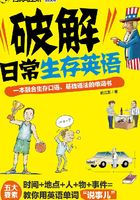
Season-5 Different Kinds of People (各种人)
S5-1 People(人的总称)
person ['pɜːsn] n. (一个)人
【固】in person 亲身
【生存句】
A: Do you want to discuss this problem over the phone right now or in person later?
(你想现在通过电话讨论这个问题,还是过一会儿当面谈?)
B: Let’s discuss it in person later. Is this afternoon good for you?
(让我们过一会儿见面讨论吧。你今天下午有空吗?)
people ['piːpl] n. 人们
【固】Chinese people 中国人
【固】young people 年轻人
race [reɪs] n. 人种,种族
【固】black race 黑种人
human ['hjuːmən] n. 人类
【固】human being 人类
population [ˌpɒpju'leɪʃn] n. 人口,人数
【固】world population 世界人口
【生存句】
A: What’s the population of New York City?
(纽约的人口是多少?)
B: The population is about 20 million or more.
(那里的人口大约是2000万或者更多。)
S5-2 Boys and Men(性别——男)
sex [seks] n. 性别
【引】gender ['dʒendə(r)] n. 性别(更正式)

man [mæn] n. 男人, 人
【引】 men [men] n. 男人(们)(man的复数形式)
【例】There are five Chinese men in the room.屋子里有5个中国男人。
male [meɪl] n. 男性a. 男性的
【固】a male student 一个男学生
boy [bɔɪ] n. 男孩
【引】gentleman ['dʒentlmən] n. 绅士,先生
who [huː] pron. 谁
【引】which [wɪtʃ] pron. 哪一个人
【生存句式】
Who is...?
……是谁?
A: Who is that boy? Which one is your schoolmate in this party?
(那个男孩是谁?在这个派对上哪个人是你的校友?)
B: That boy is my younger brother. The boy in black over there is my schoolmate.
(那个男孩是我弟弟。那边那个穿黑色衣服的男孩儿是我的校友。)
【注】schoolmate ['skuːlmeɪt]=n. 校友
S5-3 Girls and Women(性别——女)
woman ['wʊmən] n. 女人
【引】women ['wɪmɪn] n. 女人(们)(woman的复数形式)
【固】two American women 两个美国女人
female ['fiːmeɪl] a. 女的,女性的
【固】a female employee 一个女性员工
girl [ɡɜːl] n. 女孩
【引】lady ['leɪdi] n. 女士

【生存句】
A: Excuse me, do you have shoes for men and women?
(打扰一下,你们有男士和女士鞋吗?)
B: I’m sorry. We only sell shoes for kids. You can ask that lady over there. She is the manager of this mall.
(对不起。我们只卖小孩儿的鞋。你可以去问问那个女士。她是这个商场的经理。)
S5-4 Different Age Groups(不同年龄段的人)
baby ['beɪbi] n. 婴儿
child [tʃaɪld] n. 孩子
【近】kid [kɪd] n.(口语)小孩儿
【引】children ['tʃɪldrən] n. 小孩(们)(child的复数形式)
teenager ['tiːneɪdʒə(r)] n.(13~19岁的)青少年
adult ['ædʌlt] n. 成年人
【固】an adult 一个成年人
middle-aged ['mɪdl 'eɪdʒd] a. 中年的
【固】a middle-aged man 一个中年男人
an old man 一个老人
【引】old [əʊld] a. 老的
【生存句】
A: How much is a ticket for children?
(儿童票是多少钱?)
B: Half price for children under 10 years old.
(10岁以下儿童半价。)
【生存句式】
(1) How old + [is/am/are] + sb.?
某人年龄多大了?
(2) Sb. + [is/am/are] + [年龄数字] + years old.
某人……岁了。
A: How old are you? How old is your little brother?
(你多大了?你的弟弟多大了?)
B: I’m 20 years old now. My brother is 15 years old.
(我现在20岁了。我弟弟15岁了。)
